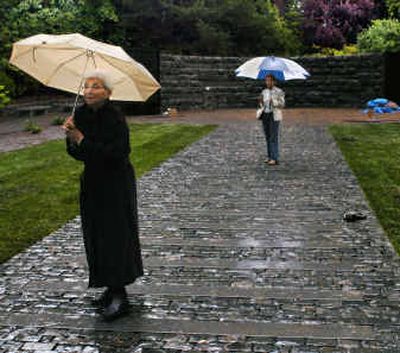Oregon Holocaust Memorial to open in Portland

PORTLAND – For years, Chella Kryszek had nightmares about the dark, crowded cattle cars that shuttled her from concentration camp to concentration camp as a Dutch Jew during the Holocaust.
She remembers stepping out of one such car in 1943 outside the notorious Auschwitz-Berkenau death camp in Nazi-occupied Poland. Smoke and flames painted the sky and there was “a terrible smell,” Kryszek said.
“We had arrived in hell,” the 76-year-old Portland woman said. “There were no tears. … You could not cry because you were in shock.”
Six decades after Kryszek’s journey, and after 10 years of often-contentious planning, Portland is about to get a Holocaust memorial that will honor the roughly 130 Holocaust survivors living in Oregon and southwest Washington.
The Oregon Holocaust Memorial, set to open today in a quiet corner of Portland’s heavily wooded Washington Park, is also dedicated to local survivors’ friends and relatives who were killed by the Nazis.
“This memorial, for us, means everything,” said Kryszek who, with the exception of her older sister, Flora, an aunt and two cousins, lost her entire family to the Holocaust.
Visitors to the Oregon Holocaust Memorial first see a replica of a European town square strewn with cast-bronze artifacts representing what was left behind – a tattered teddy bear, a pair of broken eyeglasses.
A path of Belgian cobblestones leads to a 9-foot-tall stone wall bearing quotations from interviews with regional Holocaust survivors on one side and the names of their lost relatives on the other.
On one end, buried beneath a 12 1/2-ton basalt boulder, is a vault filled with soil from the six major extermination camps used during the Holocaust.
“This is a public statement against hate and intolerance,” said Lisa Kaner, chair of the Oregon Holocaust Memorial Coalition.
A group of survivors proposed the memorial a decade ago.
Most were members of the Oregon Holocaust Resource Center based at Pacific University in Forest Grove, which provides speakers to local middle schools and high schools.
“Many (survivors) look at this as a way to fulfill some promises that were made to remember and to tell,” said Fern Winkler Schlesinger, first vice president of the resource center. “In order to teach the lessons of the Holocaust – acceptance, respect, the need to work together – it really had to come now.”
In 1995, the city designated 23,850 square feet in Washington Park as the site of the memorial.
Some people in the adjoining Arlington Heights neighborhood opposed the idea at first, worried it would increase traffic and parking problems.
“It was more a question of land use” in a space once used for tai chi lessons and Easter egg hunts, said Doris Carlsen, who serves on the board for the Arlington Heights Neighborhood Association.
Neighbors don’t anticipate a flood of visitors, but Carlsen said the memorial’s gray basalt-and-granite wall tends to cast a pall over the park.
“When you get up now to get the morning paper, the first thing you see is a memorial to the Holocaust,” said Carlsen, who lives across the street from the site.
Local organizations and individuals donated most of the $1.5 million spent to build the memorial, Kaner said. The Annenberg Foundation provided a $400,000 grant.
One of the memorial’s strongest backers is Portland Mayor Vera Katz, who escaped Nazi Germany as a young girl.
Katz said she was drawn to the project because of Portland’s reputation as a diverse, tolerant city.
“It just seemed immediately important to commemorate this uniquely evil historical event so that it’s never forgotten,” she said.